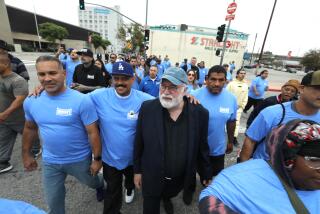T. Coraghessan Boyle
- Share via
* “Doomed, but Never at a Loss for Words,” your April 28 article on T. Coraghessan Boyle, sparked remembrances of my university days as a literature major toiling through a thesis about the absurdity of the human condition. I mused then, as I do now, about the absurdity of authors who espouse man’s propensity for self-annihilation, the inevitability of planetary doom and the meaninglessness of existence, only to contradict their worldview by the very way in which they live their lives.
Surely, if it were all for naught, why bother to procreate (Boyle has three children) and condemn our offspring to the utter foolishness of living only to die? Why create and sustain beauty of home and land (Boyle builds ponds on his Montecito property) when faced with the certitude of environmental holocaust? And why dig out from your intellectual and emotional guts literary imagery if, as the author believes, creating art is simply another of life’s platitudes? It would seem that this level of engagement implies some hope for the future. At best, this is inconsistency; at worst, it’s inauthenticity.
BERNADETTE THOMAS
Chatsworth
*
Imagine my despair while reading Boyle’s statement, “It’s all over. I don’t think there’s any hope for anybody on this planet, anywhere. I really don’t.” Imagine my relief to read that Boyle’s doomsday announcement came forth while relaxing in the den of his 1909 Frank Lloyd Wright home in Montecito. What a comfort to us all!
PHILIP DiGIACOMO
Pacific Palisades
More to Read
Sign up for our Book Club newsletter
Get the latest news, events and more from the Los Angeles Times Book Club, and help us get L.A. reading and talking.
You may occasionally receive promotional content from the Los Angeles Times.






